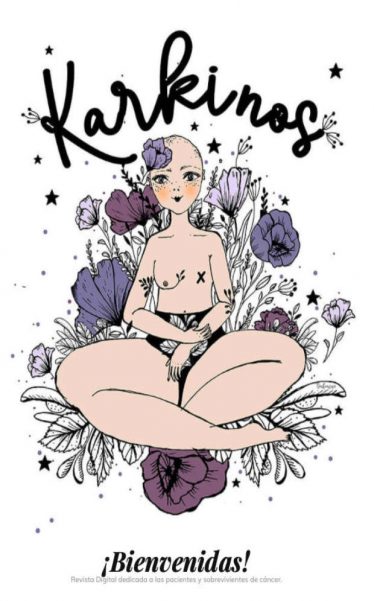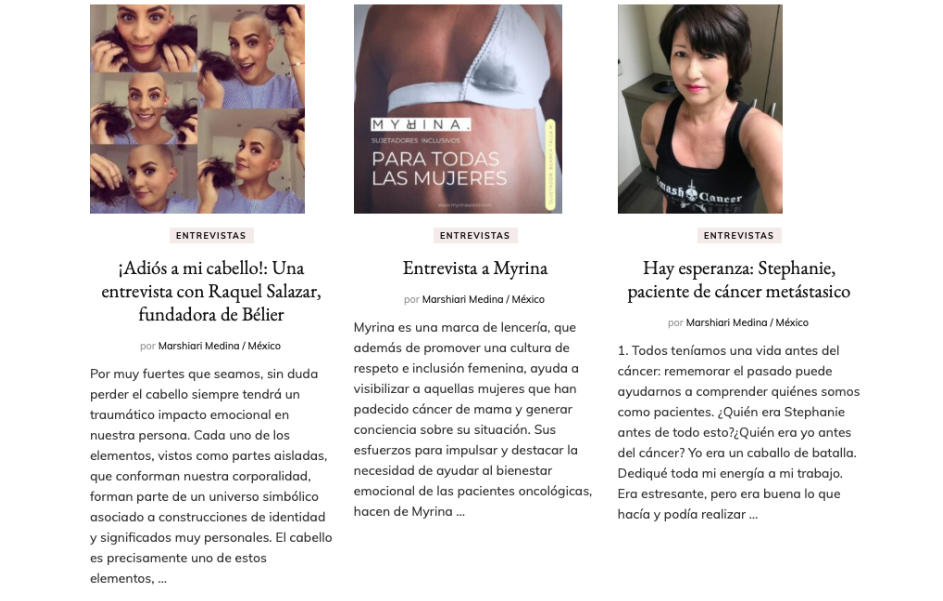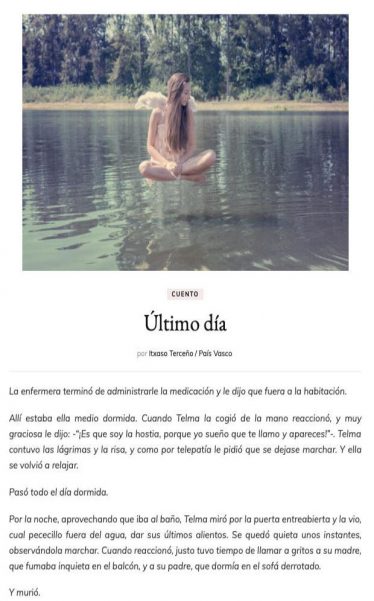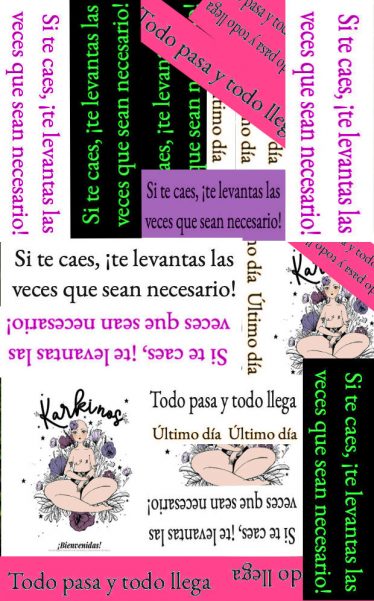This second part of the interview with Marshiari Medina focuses on her project Karkinos Magazine for cancer patients, survivors, and family members.
Beatriz Paz: How did Karkinos Magazine come about?

Marshiari Medina: When I was starting with my Teresa Magazine project, I was diagnosed with breast cancer. My life was put on pause. In November 2019 I took up the idea again and reshaped the magazine. It is a space dedicated to literature and the arts, however, on the sidelines of this project and driven by the experience of the disease, I felt the need to publish the testimonies of great women I have met during my treatment. Their stories of life, resilience, and strength, really inspire me to cope with all that “having cancer” means. In Teresa Magazine I published two interviews with cancer survivors. Although readers showed interest, I realized that I needed a space of my own, different from Teresa, so I decided to create Karkinos, a project that fortunately has been well received.
Beatriz Paz: Why is it a magazine that is not only aimed at cancer patients but also at the general public?
Marshiari Medina: We cancer patients are people before we are patients. Our stories can be those of anyone else. All of us, patients and non-patients, can connect through these stories and recognize each other.
It is very gratifying to see that the editorial board of the magazine represents a community that knows about the disease, on a personal level I think that editing something like this heals other sequelae of living with cancer, but also connects with those who need a community of support. Tell me about the experience of the collaborators.
Although Karkinos is a project that has only been going for a short time, I have received messages from women who want to tell their testimony or make a literary contribution to the magazine. Many of them are just in the process of writing something to collaborate, however, they are excited to know that there is a space where they can express themselves freely about the disease, without being judged. Ironically, cancer patients are judged from different angles.
From being blamed for getting the disease to not “healing” quickly, to being “left to die” from the disease. Cancer treatment can be very long, months, or even years. During all that time, many people see patients as whiny or ailing people who are alienated by their pain.

I know that these judgments are based on people’s ignorance and lack of knowledge about the disease – I myself was ignorant of many things before I got sick – and patients are aware of this complex situation.
So, having space where they can let their thoughts and emotions about the disease flow freely motivates them; it not only gives them the opportunity to raise their voices but also to create awareness and embrace themselves. They are all women I admire and I really appreciate their enthusiasm and participation in this project.
Beatriz Paz: I know that you belong to the Afro-Mexican community and that you are very proud that this is so. I also know that we live in a classist and racist country. Once you have gone through the health system and its challenges in terms of accessibility in all its meanings when being a patient, how do you relate both experiences in your life?

Marshiari Medina: I have always been proud of my origins, among them being of African descent, and just now I feel really happy to know that it is a root that is finally legally recognized in our country. When I was a child, assuming that identity represented something totally foreign to the unilinearity of the Mexican identity, and was even an object of mockery. Now, however, one can declare oneself to be of African descent and find a context where that story, with all its universe and history, is presented as an example of the multiple invisibilities that realities such as classism and the racialization of cultural life entail.
To answer the second part of your question, I would like to tell you an anecdote. I once had a check-up with a doctor I had never seen before. I was four months past my first chemotherapy and I had lost my hair. Those who know me well know that my hair was one of my most characteristic features because it was very curly. When the doctor saw my ID card, the first thing she said to me was: “Oh, you don’t look anything like your picture! I smiled at her, but inside I felt devastated. I felt that I had been stripped of my beauty, of my identity, of myself, and that others now saw in me another person that I was not and did not want to be.
Beatriz Paz: If we get dreamy, and it was in your power to take strategic action, how would you incorporate the world of storytelling into the cancer treatment process?

Marshiari Medina: I would love to be able to give a literature workshop to cancer patients, and show them that everyone can narrate and own their own story. That words help us to heal emotions, to release our fears, to be grateful, and to say goodbye to what we have to let go of. I know how difficult it is when suddenly your life takes a 180-degree turn and you are in front of a group of doctors, who with the best of intentions, will be part of your life for months, and all that time you do not stop, you do not stop, you go on, here and there, blood shots, chemotherapy, pills, medications, check-ups, pain, tears, and more pain, and fear, and you go on and on. For me, the writing was like a respite. It was the moment when I felt I had power and control over myself. There were the words to say the only thing I could and should say, and it was okay. So I believe that, if in some future cancer treatments incorporate artistic and narrative expression workshops, in any of their forms and colors, I am sure that the emotional quality of life of many patients will be much more satisfactory and will allow a much faster and effective healing process.
Beatriz Paz: Do you think about other formats that make the literary experience accessible to patients who sometimes will not be able to read?
Marshiari Medina: Yes, I have thought about audiobooks, Braille books, movies, etcetera. Unfortunately, however, I am subject to the physical and monetary laws of this universe. Although I dream big, my pockets have holes in them and my dimes and nickels come out, so that’s it, a dream that I hope one day I can fulfill.


